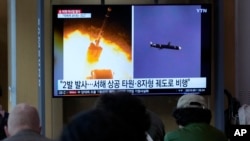Washington has exhausted viable options for containing North Korea’s missile and nuclear programs and now must prioritize deterring the regime from using its weapons to carry out attacks against the U.S. and its allies, experts say.
North Korea test-fired 27 missiles so far this year, believed to be a record, in defiance of the U.S. and South Korea, which responded with a show of force.
This month, the regime of leader Kim Jong Un has conducted six missile tests, mostly involving ballistic missiles banned by U.N. sanctions.
The latest test came with Friday’s launch of a short-range ballistic missile. A short time earlier, Pyongyang dispatched about a dozen warplanes near the inter-Korean border, prompting South Korea to send F-35 fighter jets to ward them off.
On October 10, North Korea said the purpose of its missile launches over the previous two weeks was to assess “nuclear counterattack capabilities” on targets in South Korea. It said the U.S. redeployment of the USS Ronald Reagan to the region made the launches necessary for its self-defense.
The U.S. Navy adjusted course for the nuclear-powered aircraft carrier on October 5, a day after Pyongyang fired an intermediate-range ballistic (IRBM) missile over Japan for the first time since 2017. The aircraft carrier departed the area after participating in naval exercises with South Korea.
Deterrence by default
Experts said Washington now must focus on preventing Pyongyang from using its nuclear weapons and missiles to launch an actual attack against the U.S. and its allies, as trying to curb the regime from developing and testing them seems unlikely.
Harry Kazianis, the president of the Rogue States Project, said, “Washington is now forced to essentially accept North Korea as a de facto nuclear weapons state.”
Christopher Johnstone, who recently served as the director for East Asia under President Joe Biden and now is Japan Chair at the Center for Strategic and International Studies (CSIS), said, “The most realistic approach in the near term is to strengthen deterrence, including through closer defense cooperation among the United States, Japan and South Korea.”
Washington, Seoul and Tokyo conducted several trilateral exercises, including on October 6, two days after Pyongyang launched its missile over Japan.
The U.S. National Security Strategy published on October 12 says “strengthening extended deterrence in the face of North Korean weapons of mass destruction and missile threats” is Washington’s goal as it seeks diplomacy to denuclearize the Korean Peninsula. The National Security Strategy is a legally mandated annual report sent by the White House to Congress to present the national security vision of the executive branch to the legislative branch.
“North Korea may not be persuaded to abandon its programs," said Scott Snyder, director of the program on U.S.-Korea policy at the Council on Foreign Relations. “Deterrence is important in terms of discouraging use.”
Denuclearization options
Experts said Washington’s options for denuclearization may have been exhausted as they see a Pyongyang uninterested in dialogue striving to become a nuclear state.
“The United States and its partners and allies have tried virtually everything,” said Evans Revere, a former State Department official with extensive experience negotiating with North Korea. “Nothing has convinced or compelled North Korea to make [a] strategic decision to give up its nuclear weapons and missile programs. So far, evidence suggests that a decision to denuclearize or even freeze missile and nuclear programs is highly unlikely.”
He added, however, that denuclearization should not be ruled out as a long-term goal, and one option at Washington’s disposal is to make it “as painful as possible” for North Korea to develop and test its weapons by imposing heavy sanctions in cooperation with U.S. allies and partners.
Three days after North Korea flew the IRBM over Japan, the U.S. Treasury issued new sanctions on North Korea-connected individuals and entities that support its weapons programs.
The U.N. Security Council remains divided on how to handle the regime’s IRBM flight over Japan. China and Russia defended the missile launch as a defensive measure against U.S. threats, leaving the council’s October 5 meeting on North Korea to dissolve without an agreement on next steps.
Ken Gause, director of the Adversary Analytics Program at CNA, said, “We missed the boat on denuclearization.”
“The failure in Hanoi was our last best chance for the near term,” Gause said. “You have to freeze the program. That’s the best you can do.”
Dialogue between Washington and Pyongyang remains stalled since working-level talks in Stockholm failed in October 2019. The Hanoi summit in February 2019 broke down over disagreement on Pyongyang-sought sanctions relief and Washington-sought denuclearization.
North Korea has already ruled out denuclearization by codifying into law on September 8 its readiness to use nuclear weapons in the event of what it perceives as an imminent threat.
John Kirby, the National Security Council’s director of strategic communications, said on October 11 that Pyongyang has not responded to U.S. offers for talks.
VOA’s Korean Service contacted North Korea’s U.N. mission in New York asking under what circumstances Pyongyang would be interested in talks but did not receive a reply.
Robert Einhorn, a former special adviser for nonproliferation and arms control at the State Department who is now a current senior fellow at the Brookings Institution, said Pyongyang is “not going to be prepared even to make substantial reductions in its capabilities” or “limitations” of its programs unless it receives “very significant concessions by the United States and its partners.”
Einhorn said Pyongyang is completing and enhancing a list of weapons its leader Kim announced in his speech in January 2021.
They include some already tested, such as tactical nuclear weapons, ICBMs, a submarine-launched ballistic missile, and new types of ballistic missiles, among others.







